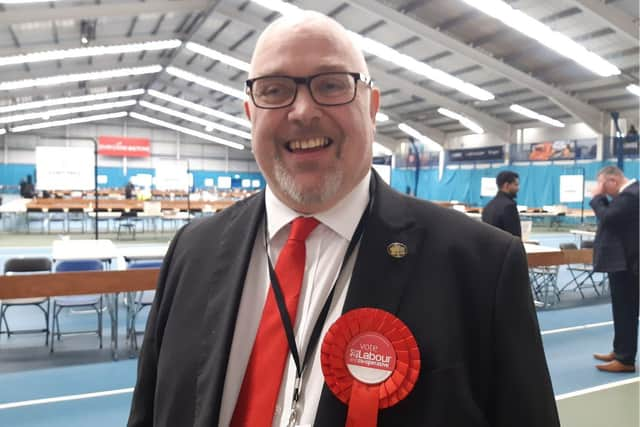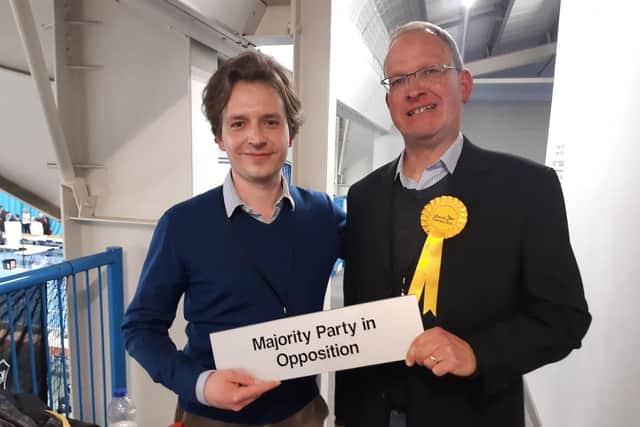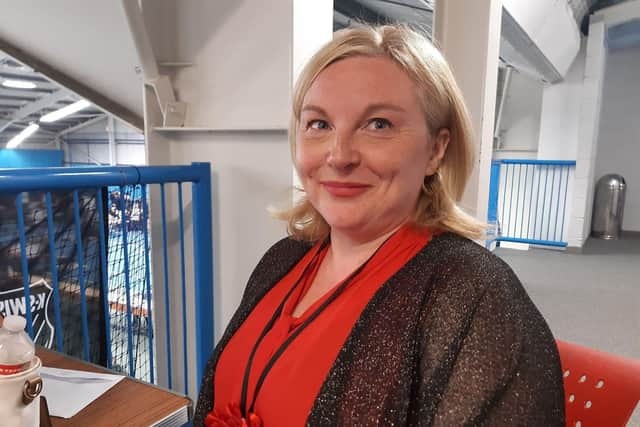Sunderland City Council elections 2023: Party leaders react to the results
and live on Freeview channel 276
Senior figures in Wearside’s ruling political group said they were "very happy" with the results of the 2023 polls, which saw the Labour Party increase its overall majority on the city council.
As the polls closed on Thursday, May 4, candidates flocked to Silksworth Community Pool, Tennis and Wellness Centre where votes were counted for the 24 seats contested across the city.


Advertisement
Hide AdAdvertisement
Hide AdWhen the dust settled in the early hours of Friday morning, Labour had successfully defended all of its seats while picking up new seats in Ryhope, Barnes and St Anne's, with the Liberal Democrats also gaining a seat in Fulwell.
Although Conservatives defended several key seats they were left counting their losses after losing wards to both Labour and the Liberal Democrats.
Councillor Graeme Miller, leader of Sunderland City Council, said the positive night for the Labour Party comes off the back of work nationally and locally.
He said: "I'm very happy with the fact that the Labour vote across the city is up and that surely means that people are beginning to have trust in us again given the work that we have done over the last five years.


Advertisement
Hide AdAdvertisement
Hide Ad"To take opposition seats in areas where we have struggled to do that in the past is very pleasing, to finish any election night up on your seats is always preferred to down.
"So I think it shows that the Labour option for people is being considered again and we just need to keep at that and continue to gain trust with the electorate and we will gain more seats".
After losing around 20 Labour councillors over elections in 2019 and 2021, and just one in 2022, Cllr Miller said he was hopeful the Labour Party would continue to regain the confidence of more residents in future.
The council leader added national issues had also had an impact on the local results and turnout figures.


Advertisement
Hide AdAdvertisement
Hide AdCllr Miller continued: "It's cost of living, it's food, it's mortgage and rents, it's putting fuel in the car.
"We have had issues on the door regarding our green credentials, what are we doing with trees or with bulky waste and we have addressed them.
"So I think definitely is those national issues that are plaguing everyone".
Notable gains for the Labour Party on the night included Ehthesham Haque in the Barnes ward with a 142-vote majority over Conservative Kevin Leonard.
Advertisement
Hide AdAdvertisement
Hide AdIn Ryhope, Lindsey Leonard was also victorious taking a seat previously held by outgoing independent councillor Steven Bewick.
The Labour Group also gained a seat in St Anne's ward, with candidate Catherine Hunter emerging victorious with a 287-vote majority over Conservative Pam Mann.
Although the Liberal Democrats only made one gain on the night through the election of new councillor Peter Walton in Fulwell, the party successfully defended seats in Millfield, Pallion, Sandhill and Doxford.
Cllr Niall Hodson, Liberal Democrat Group leader, said the results mean his party is now the official opposition on the city council.
Advertisement
Hide AdAdvertisement
Hide AdCllr Hodson said: "Excellent news for the Liberal Democrats, we have become the majority opposition on Sunderland City Council.
"So it's quite clear now that Sunderland is a Labour-Lib Dem contest".
Cllr Antony Mullen, leader of the Sunderland Conservatives, said the results had been influenced by national issues, as well as impacts on voter turnout.
Cllr Mullen added: "It's obviously a bad night for the Conservatives as I suspected it was going to be nationally, we didn't lose as many [seats] as I thought we were going to lose.
Advertisement
Hide AdAdvertisement
Hide Ad"I had prepared based on our feedback on the doorstep to lose four and we lost three, so in line with but not quite with what I expected.
"Clearly the story of the night is not that Conservative voters have turned Labour, it's that they haven't turned out at all and we have seen huge drops in our support simply because Conservatives haven't voted.
"So in my ward (Barnes) for example, Labour actually got fewer votes than they did last year and won, we lost 500 because those people didn't turn out at all.
"So I think the drop in turnout across the city is Conservatives who have decided that they have no enthusiasm to vote for us but equally, they have no enthusiasm to go elsewhere either".
Advertisement
Hide AdAdvertisement
Hide AdHowever the Sunderland Conservatives leader said the party would still continue to provide opposition to Labour and was hopeful the party's fortunes would improve in future contests, including in future 'all-out' council elections.
Reform UK, which stood candidates in the majority of wards, and the Green Party, did not see any councillors elected on May 4.
Now the council’s overall make-up is 45 Labour councillors, 15 Liberal Democrats, 13 Conservatives and one Reform UK.
There also remains one vacancy in the Hendon ward due to the death of a candidate ahead of the election, which will be contested later this year.
Advertisement
Hide AdAdvertisement
Hide AdThe elections nationally also saw a row over the voter ID requirement, which follows a change in the law requiring voters to have a photograph document from a defined list to protect against the potential risk of electoral fraud, despite there being no evidence of a large-scale problem.
The Government has estimated that about 4% of Britain’s population – or two million people – were unlikely to have a valid form of photo ID to vote.
Passports, driving licences and blue badges are among the IDs permitted, as are the free certificates that could be applied for ahead of the vote.
Photo ID will be required in England during future general elections under the policy.